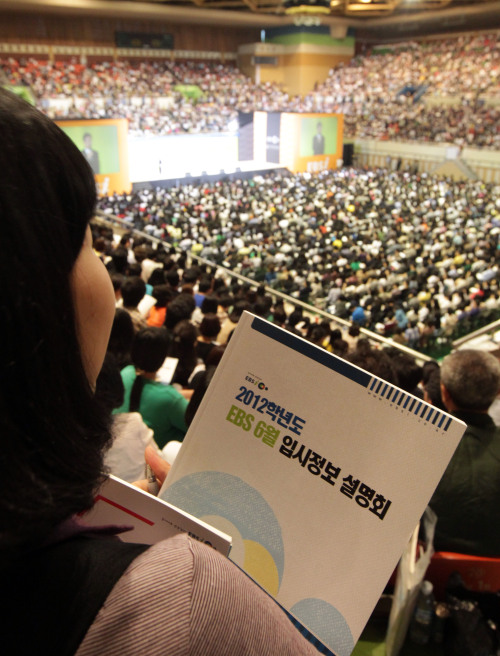This is the first installment of a three-part series looking into problems in Korea’s tertiary education system. ― Ed.
After nearly a year of job hunting, Lee decided to lower her expectations.
The 27-year-old graduate of a university in Seongnam, Gyeonggi Province, now goes to a vocational training institute in Seoul to learn how to make coffee. Hopefully, after completing this four-month course, she will be able to find a job at one of the coffee shops which seem to be at almost every corner of the city.
“I had tried to find an office job but had no luck,” Lee said, declining to give her first name.
Her B.A. degree in French literature will be of little use for a barista job, she admitted.
A starting barista earns about 1.3 million won ($1,200) a month. A cup of coffee-based drink from famous coffee chains like Starbucks costs around 5,000 won.
From an economic point of view, Lee’s four-year university education, which cost her parents about 30 million won in tuition alone, was a terrible investment.
After nearly a year of job hunting, Lee decided to lower her expectations.
The 27-year-old graduate of a university in Seongnam, Gyeonggi Province, now goes to a vocational training institute in Seoul to learn how to make coffee. Hopefully, after completing this four-month course, she will be able to find a job at one of the coffee shops which seem to be at almost every corner of the city.
“I had tried to find an office job but had no luck,” Lee said, declining to give her first name.
Her B.A. degree in French literature will be of little use for a barista job, she admitted.
A starting barista earns about 1.3 million won ($1,200) a month. A cup of coffee-based drink from famous coffee chains like Starbucks costs around 5,000 won.
From an economic point of view, Lee’s four-year university education, which cost her parents about 30 million won in tuition alone, was a terrible investment.

Still, most parents in Korea strongly believe that higher education is the best way to prepare their children for fiercely competitive Korean society.
According to a survey conducted by Statistics Korea last year, 93 percent of parents polled expected their children to finish a four-year university degree at least.
“Everybody goes to university in Korea. So if you don’t, you will be discriminated against and will find it hard to join mainstream society,” said Ahn Jin-gull, a director at Seoul-based civic group People’s Solidarity for Participatory Democracy.
Koreans proudly say that the well-educated labor force was the main driver of the country’s miraculous rise from the ashes of the Korean War.
But their passion for education has gone way overboard. The country of 48 million now has 347 colleges and universities and 3.3 million people enrolled in them. Eighty percent of high school graduates advanced to tertiary education. This means that one in every 14 Koreans is a university student.
According to the Organization for Economic Cooperation & Development, 56 percent of Koreans aged 25-34 received higher education, which is the second highest rate among the OECD’s member countries, after Canada.
“Entering a university has become the goal of education,” said Lee Seung-geun, an official of Korean Council for University College Education. “We’re teaching our children to enter a good university, with no consideration of what they want to become,” he said.
The problem is the economy is creating not enough quality jobs for college graduates.
“Over the past two decades, the number of college and university students doubled. But the number of jobs for graduates hasn’t grown that much,” an official at the Finance Ministry said.
The mismatch between university education and the labor market is a key challenge facing the nation.
In May, the country’s overall unemployment rate stood at 3.2 percent and the number among under 30s was 7.3 percent. The official data, however, fails to show the real situation, economists say.
A lot of college students delay graduation until after they secure a job, prepare for exams for public-sector jobs or various skills certificates to pad their resume, which exclude them from the official count of the jobless, they say. Some flee to graduate schools, or like Lee, lower their expectations to take lower-level jobs.
A study by Nam Jae-ryang, a research fellow of Korea Labor Institute says that nearly 40 percent of those who graduated from universities in February are still without a job yet.
“Every year, colleges and universities churn out nearly 500,000 graduates, but the kind of jobs they want ― such as jobs at large companies, public firms or government agencies ― are limited at 100,000 at most,” Kim Hee-sam, a researcher at the Korea Development Institute said.
By Lee Sun-young (milaya@heraldcorp.com)











![[Today’s K-pop] BTS pop-up event to come to Seoul](http://res.heraldm.com/phpwas/restmb_idxmake.php?idx=644&simg=/content/image/2024/04/17/20240417050734_0.jpg&u=)




![[KH Explains] Hyundai's full hybrid edge to pay off amid slow transition to pure EVs](http://res.heraldm.com/phpwas/restmb_idxmake.php?idx=652&simg=/content/image/2024/04/18/20240418050645_0.jpg&u=20240419100350)

